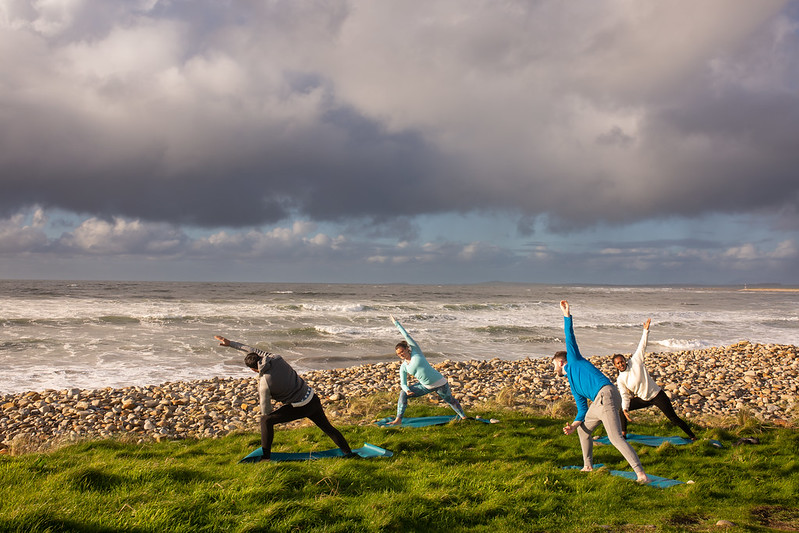It is normal to feel anxious when starting something new, like a university course, and everyone feels stress at difficult times of the year like exam periods or when there is a lot happening in their lives. It can sometimes be hard to relax. This activity is about helping you to manage these feelings and includes tips from other autistic students.
Background

Students in the Autism&Uni surveys said they found these things stressful at university:
- Choosing the right subject to study
- Group work (see the Group Work activity)
- Sudden changes to timetables and assignments (speak to your lecturer or tutor about how these affect you)
- Exams
- Not getting the support they needed (see Needs Assessment activity)
- Noisy classrooms and lecture theatres (see What are lectures really like?)
- Not liking where they live
- Sensory issues
- Getting lower marks than they hoped for
- Travelling to and from university
- Fitting in (see Talking about your autism activity)
- Making presentations and talking in public
How could this affect me?
 Other people on your course will probably be struggling with many of the same issues (hopefully not all at the same time!). As autistic people tend to have higher levels of anxiety than other adults, it’s important to know how to deal with these feelings (alongside other forms of support like therapy, counselling and medication where appropriate) so that they don’t become overwhelming.
Other people on your course will probably be struggling with many of the same issues (hopefully not all at the same time!). As autistic people tend to have higher levels of anxiety than other adults, it’s important to know how to deal with these feelings (alongside other forms of support like therapy, counselling and medication where appropriate) so that they don’t become overwhelming.
Hopefully you will have been able to access support at university and have other people you trust to talk to when you are finding things difficult, like friends, family members and professionals. However, it’s a good idea to have places where you can go and activities you feel comfortable doing yourself when you feel overloaded and stressed.
What to do next?
Try out some of the activities below
Practical tips
These activities were popular with the students and graduates in our surveys for reducing stress:
- Exercise/sport, particularly outside
- Music
- Art
- Meditation and mindfulness
- Favourite food and drink
- Chatting with family and friends
- Mentoring
- Talking to lecturers and tutors
- Spending time with animals if this is possible. If you do not have an animal maybe you can work out a safe handover with a friend who does
- Online games or other leisure activities you enjoy.
There is also a useful breathing exercise video on YouTube:
Here’s what some of the students and graduates had to say about other things that helped them:
- “Craft is relaxing, also being prepared for situations.”
- “My support worker helps me calm down.”
- “Drawing in my notebooks.”
- “Chatting in an online forum with other neurodiverse students.”
- “Focusing on the causes of the situation.”
- “Some friends called the ‘Mental Wing’ were incredibly supportive.”
- “Throwing myself into union activities: attending meetings, planning events, helping with campaigns.”
- “Email contact with my tutor. Face to face I would have been reluctant to arrange or attend.”
- “Getting away from horrible food in the residences.”
- “Clubbing :-)”
It’s also really useful to have places where you can go if you feel overloaded or need to relax – several students said quiet places were really important to them. Here’s where they say they go:
- The library
- The gym
- Outside for a walk
- Green space around campus
- Quiet study rooms
- Coffee shop
- Computer rooms
- Back to their room
- Disability service
- Drinks machine
The Psychological Society of Ireland (PSI) has compiled a practical and evidence-based list of tips for well-being, prosperity and mental health. Whether you want to learn to be more content in general or are struggling to cope with a challenging situation, it is worth checking these out.
Find below 15 of these tips:
- Look after your basic needs first: Eat and Sleep.
Before trying to tackle any of the complex demands of day-to-day life, it is vital that we start with good energy levels. Feeling tired and/or hunger can make many problems seem worse, so make sure to get the sleep you need and maintain a good balanced diet.
- Do what you love.
Getting good at something doesn’t often come easy. It’s practice that makes perfect. If you like something, you are more likely to work hard at it to become very good at it. When it comes to choosing what you would like to do, choose something that you like.
- Don’t let a little anxiety stand in your way.
While there are obviously certain fear-inducing situations or activities that should be avoided, often we can avoid doing things that we want to do which are potentially beneficial to us. Actively engaging in these activities or situations can add to our experience of well-being. Avoiding only results in increased anxiety about these activities/ situations.
- Listen to your body and use your breathing.
Take time each day to pay attention to your body and what it is telling you. Try to recognise when your body and mind are stressed. Can you feel the tension of stress building up? Sore back? Headaches? Don’t ignore these signals. Try to alleviate them before they build up. Take a few deep breaths, then imagine you are breathing into and out from this tension and letting it go. This can be the most useful immediate tip to stop getting caught in a cycle of stress.
- Set academic goals to better yourself, not others.
It can be a competitive world, and we can often feel pressured to do better than the people around us, rather than simply trying to better ourselves. Research has shown that students who work towards improving their own performance, rather than working towards outperforming others, show the best motivation, learning strategies, and academic outcomes.
- Set yourself realistic goals.
Break your big goals into smaller steps or tasks. Smaller tasks are much easier to complete, and it’s easier to see your progress. This also provides a gradual sense of accomplishment that can motivate you to continue. Rome wasn’t built in a day but some of it was!
- Focus on the things you can change.
When you are not doing as well as you would like in a particular behavior try as best you can to focus on what you can change and on what is controllable e.g. the amount of effort you put in or on the way you are going about it. This can help to foster a more positive feeling of hope and help you to persist in the task.
- Write things down.
Writing things down can greatly help when planning and/or when coping with a problem(s). It can help you to organise and formulate your situation, thoughts, and feelings. It can allow you to look at the situation as an outsider and to subsequently rewrite it from a more detached perspective. You can then keep, delete, or tear up these notes when you finish.
- Be flexible in your thinking.
Avoid as best you can “all or nothing” “black or white” and absolute thinking. Do you find yourself using words like “should”, “must” and “cannot”? Using such language can mean that you end up living by very fixed rules. This can lead to increased stress and even anxiety or a low mood. Try substituting a different word. Instead of “I must” or “I should”, try “it would be helpful if I …” In addition, notice how you label events. Is missing that bus really a disaster? Or is it a nuisance, inconvenient, or annoying? How you think and talk about events can really influence your mood and its intensity.
- Ask for help.
The longer you leave a problem, the worse it may become. Don’t be afraid to ask for help from a family member, friend, tutor, student support adviser, or professional. Asking for and accepting help from a trusted family member and/or friend strengthens your ability to cope. If you feel overwhelmed or have difficulties meeting your goals on your own, consider seeking help from a professional.
- Engage in meaningful, creative activities.
Get involved in meaningful creative work. Do things that challenge your creativity and make you feel productive. Things like playing an instrument, drama, drawing, writing, singing, building something etc.
- See fun as a priority not an indulgence.
Give leisure time a priority. Do things for no other reason than that it feels good to do them. Listen to music, read a good book, take a walk, go to a fun movie, meet up with a friend. Fun is an emotional and wellbeing necessity.
- Get active.
While physical activity (that suits you and your level of ability) is good for your body, exercise is good for the mind too. Regular exercise gives you energy, improves your mood, and relieves stress, anxiety, and depression. Once you get into it it can also be great fun!
- Drink alcohol responsibility and in moderation.
The Department of Health and Children advises that up to 21 standard drinks a week is considered low risk for men and up to 14 standard drinks a week is considered low risk for women. Drinking above these advised weekly limits is associated with much poorer outcomes for one’s mental and physical health. Also, if you enjoy a drink it is advised to spread out your drinking over the week and not save it for one session or a big night out.
- Develop and maintain close relationships.
Almost every close relationship may involve some negative experiences. However, the positive emotions, shared experiences, and closeness that come with such relationships have a strong link with well-being and health and help to buffer against stressors.
Foot Note: For a full listing of the Psychological Society of Ireland’s 40 tips for mental health, well-being and prosperity visit www.psihq.ie
ATU Student Counselling Service
College is a big step with many rewards but also challenges. Counselling can be helpful for all kinds of difficulties, both academic and personal. The Counselling Services at ATU offer a professional counselling service, which is a safe, open and non-judgmental place to discuss whatever a student’s concerns are.
Talking it over with a trained professional can help students to see things more clearly, better understand their choices and develop more effective ways of coping.
The service offers students the opportunity to explore any issue, big or small, which may impact their mental health and general well-being.
The service is available to all ATU registered students who reside in the Republic of Ireland. Counselling services are available on campus, remotely, and online.
Be assured that confidentiality is a central and integral part of the counselling process.
Please use the contact details below to make an appointment. When a student contacts the service, an appointment request form will be sent to them. When this is returned, the student will place you on the waiting list for counselling. Students are offered a service in order of receipt of the appointment request form.
Urgent appointments are available for students in a high level of distress and when they are at risk to themselves or to another.
Please click the individual college service contact details.
Donegal Student Counselling Service
Email: counselling.donegal@atu.ie
Phone: 074 91 86855
Sligo and St Angela’s Counselling Service
Email: counselling.sligo@atu.ie
Phone: 071 93 05463
Galway (Dublin Road, Mountbellew and Wellpark)
Email: counselling.galwaymayo@atu.ie
Phone: 091 74 2228
Mayo and Letterfrack
Phone: 094 90 43237
Email: Counselling.Mayo@atu.ie
Questions to think about
- What do you like to do at home that makes you feel relaxed?
- What food and drink makes you feel better? Can you make sure you have some with you?
- Who can you talk to?
- What do your lecturers and tutors know about how your autism affects you?
- Where can you go if you feel stressed out? Make a list of places.
- What is your favourite form of exercise? Even non-sporty people can usually find something they enjoy.
Additional information
ATU Student Health Service
The Student Health Service has three on campus medical services one each on the Letterkenny campus, the Galway City campus and the Sligo campus. These provide services to students attending these campuses in addition to Mountbellew, Wellpark and St Angela’s.
The unit is staffed by a team of nurses and doctors who have extensive experience in student health issues and can offer specialist clinics to students, all completely free of charge!
The on-campus Student Health Service offers an acute illness and emergency service for students who fall ill while at college and it is not possible to visit their own GP.
The Student Health Service offers in-person and telephone consultations by appointment, Monday to Friday during term time.
All information provided by the doctor or nurse is confidential and is not disclosed to any other person, without the permission of the student concerned. All records are kept on a separate network to the main system and are not shared.
In Connemara, Killybegs and Mayo, Students as needed can access a community-based GP service as required free of charge.
Prescription Medications
For all students taking prescription medication, it is imperative that they bring with them a letter from their own specialist team with the drug name and dosage of medications prescribed. Please note that regulation of medications differ from one country to the next and it is the student’s responsibility to check if their prescribed medications are licensed in Ireland.
Where a student is being prescribed medications in relation to conditions such as ADHD, certain mental health issues or gender-affirming hormone therapy, these will require significant documentation for prescribing in Ireland, including a letter from your current specialist confirming ongoing clinical care during your time in Ireland, and the date of your last and next specialist review appointments. Some medications cannot be prescribed in the absence of this information.
Student Health Service – Atlantic Technological University
Mind tips for coping with student life


 Back
Back